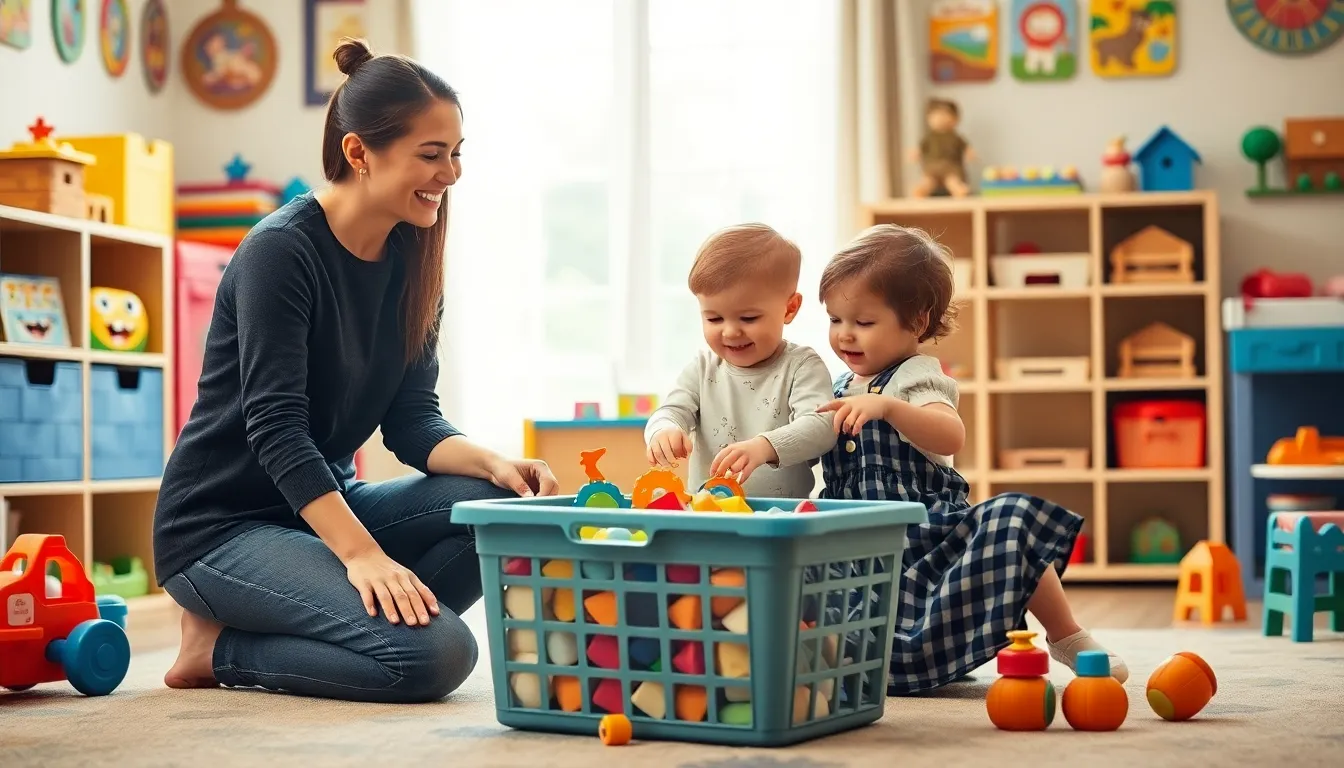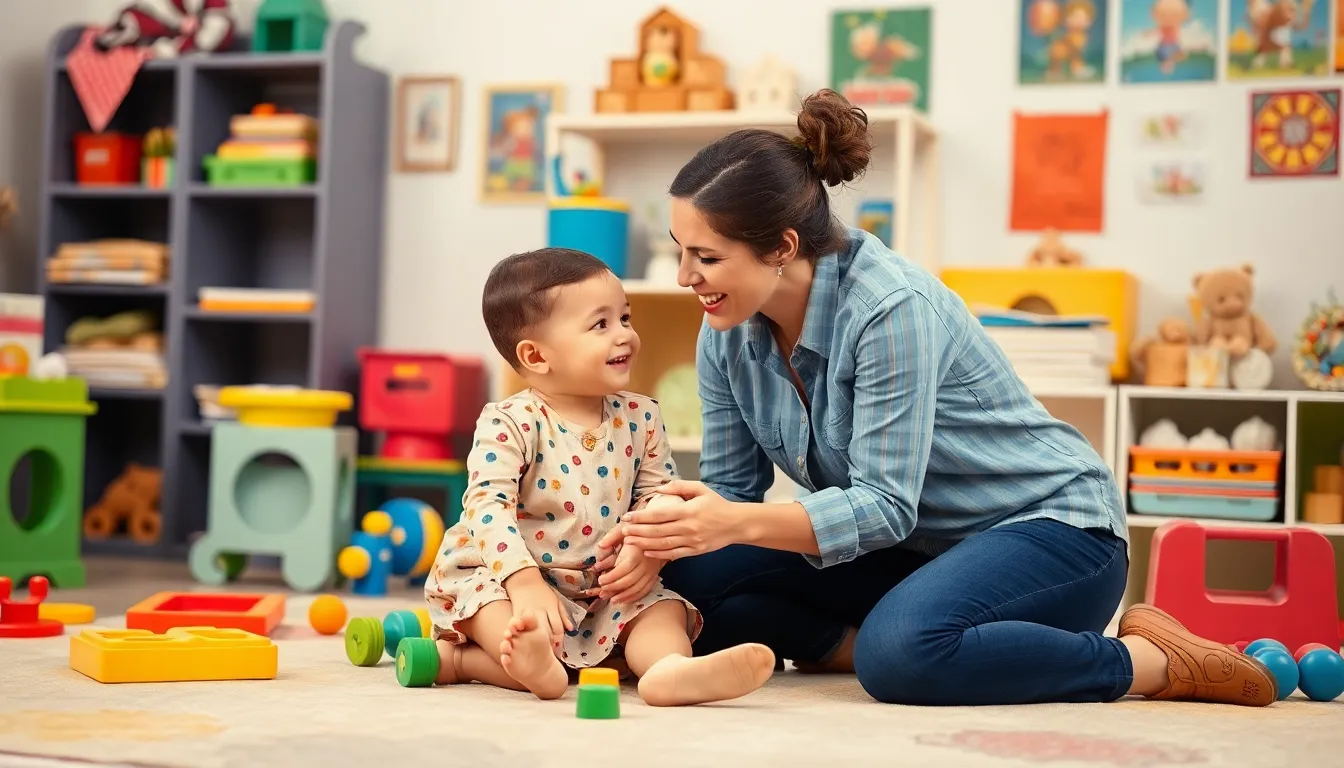Navigating the wild world of toddler discipline can feel like trying to herd cats—adorable, chaotic, and often unpredictable. Parents find themselves in a constant tug-of-war between wanting to instill good behavior and maintaining their sanity. With tiny humans throwing tantrums that could rival a Broadway show, it’s clear that a solid strategy is essential.
Table of Contents
ToggleUnderstanding Toddler Discipline
Discipline plays a critical role in early childhood development. Effective strategies shape behavior and lay the foundation for future social interactions.
The Importance of Discipline in Early Childhood
Discipline guides toddlers toward understanding appropriate behavior. It teaches boundaries and consequences, fostering respect and empathy. Establishing a consistent routine creates security, enhancing a child’s ability to learn. This security allows them to experiment with actions while knowing their limits. Positive reinforcement is key; encouragement nurtures good behavior and strengthens self-esteem. Ultimately, a well-disciplined toddler grows into a more cooperative and adaptable child.
Common Misconceptions About Toddler Discipline
Many misunderstandings surround toddler discipline. Some believe discipline equates to punishment, leading to confusion and fear. Discipline focuses on teaching rather than merely correcting. Another misconception is that consistency is unnecessary; however, inconsistency can confuse toddlers. Discipline also doesn’t require harsh measures; gentle guidance is often more effective. Finally, parents may think discipline stifles creativity, but it provides a framework that allows creativity to flourish within safe boundaries.
Effective Discipline Strategies

Effective discipline strategies help parents guide toddlers toward appropriate behavior. Using consistent methods creates structure and security for young children.
Positive Reinforcement Techniques
Positive reinforcement boosts good behavior effectively. Praising a child for sharing or saying “thank you” encourages more of that behavior. Reward systems, like stickers for completed tasks, motivate toddlers to make better choices. Celebrating small victories builds a child’s self-esteem. Using specific praise, such as “You did a great job putting away your toys,” reinforces desired actions clearly. Children respond well when they feel recognized and valued, making positive reinforcement a powerful tool in discipline.
Setting Boundaries and Consistency
Setting clear boundaries helps toddlers understand acceptable behaviors. Defining limits, like screen time or playdates, offers a sense of security. Consistency in enforcing these boundaries ensures children feel safe in their environment. When a parent consistently follows through with rules, toddlers learn the consequences of their actions. Using calm and steady communication clarifies expectations, while adjusting boundaries as children grow fosters independence. Clear and consistent guidelines support a toddler’s development and encourage respectful behavior.
The Role of Communication
Communication plays a significant role in toddler discipline, acting as a bridge to understanding and connection. Effective communication fosters emotional growth and helps toddlers navigate their feelings.
Teaching Emotional Expression
Teaching emotional expression equips toddlers with the tools to articulate their feelings. Words like “happy,” “angry,” and “sad” help children recognize emotions, which promotes emotional intelligence. For example, parents can model these emotions by stating, “I feel frustrated when toys are not picked up.” Encouraging toddlers to share their feelings builds a safe space for open dialogue. Young children benefit from activities like reading books about emotions, which normalize discussing feelings. Recognition of these expressions enhances a child’s ability to cope with strong emotions, leading to improved self-regulation.
Encouraging Dialogue with Toddlers
Encouraging dialogue strengthens relationships and enhances comprehension. Engaging toddlers in conversations strengthens their vocabulary and understanding of concepts. Asking open-ended questions, such as “What did you enjoy most today?” sparks thoughtful responses. Active listening validates their feelings and reinforces confidence in expressing thoughts. Parents can create routines that incorporate dialogue, like family discussions during meals or bedtime storytelling. These opportunities nurture communication skills, as well as provide a platform for toddlers to learn about boundaries and acceptable behaviors. Overall, effective dialogue supports toddler development and fosters mutual respect.
Addressing Challenging Behaviors
Managing challenging behaviors in toddlers often involves understanding the root causes and implementing effective strategies. Parents can use specific techniques to minimize issues like tantrums and aggression.
Tantrums and Whining
Tantrums occur as toddlers express frustration or seek attention. Maintaining calm during these episodes proves essential. Ignoring minor tantrums while acknowledging feelings can help children learn appropriate emotional responses. Offering choices, such as selecting a toy or snack, encourages cooperation and reduces whining. Consistently applying this approach creates predictable outcomes, fostering a sense of security. Parents should recognize that recognizing emotions can enhance a child’s emotional vocabulary, reducing future outbursts.
Aggression and Defiance
Aggression often results from frustration or unmet needs. Observant parents identify triggers to address underlying issues. Redirecting energy through physical activities like running or jumping makes a difference. Establishing clear expectations reinforces acceptable behavior. Implementing time-out strategies for aggression allows toddlers to understand consequences without harsh punishments. Modeling positive behavior, such as using words to express feelings, promotes peaceful conflict resolution. Gentle reminders during moments of defiance reinforce the importance of respectful communication and ultimately guide children toward positive interactions.
Toddler discipline is a vital aspect of parenting that shapes a child’s understanding of behavior and boundaries. By implementing consistent strategies and fostering open communication, parents can create a nurturing environment that promotes emotional growth and respect. Positive reinforcement and clear expectations not only guide toddlers toward appropriate actions but also build their self-esteem.
Navigating the challenges of toddler discipline requires patience and flexibility. As children grow, adapting methods to suit their developmental stages will support their independence while maintaining a secure framework. Ultimately, effective discipline is about teaching and guiding rather than punishing, laying the foundation for a respectful and empathetic future.





